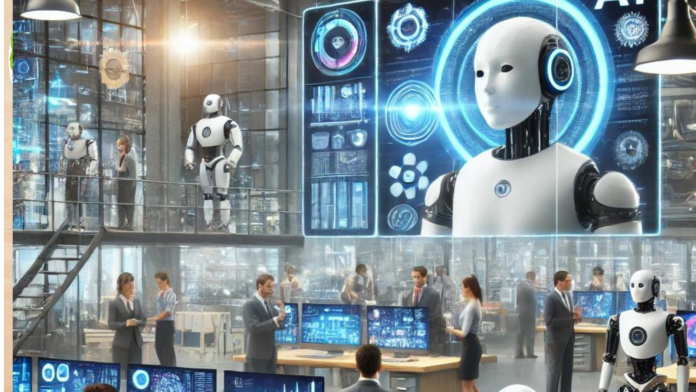Artificial Intelligence (AI) is no longer a concept of the distant future. It has rapidly evolved from a niche technology into a vital tool that businesses across all industries are leveraging to enhance productivity, streamline operations, and deliver innovative customer experiences. From automating routine tasks to generating insights from vast data sets, AI is transforming the way companies operate and compete in the global marketplace.
In this article, we’ll explore how AI is revolutionizing various sectors and why its adoption is becoming critical for businesses of all sizes.
What is AI?
AI refers to the development of systems or machines that mimic human intelligence, performing tasks like learning, reasoning, problem-solving, and decision-making. Through machine learning (ML), natural language processing (NLP), and computer vision, AI can analyze data, recognize patterns, and make predictions with minimal human intervention.
AI Applications Across Industries
AI is versatile and can be adapted to numerous industries. Here are some of the key sectors where AI is making a significant impact:
- Healthcare
AI is revolutionizing healthcare by improving diagnostics, personalizing treatment plans, and optimizing administrative tasks. Some of the key applications include:
– Medical Imaging: AI-powered systems can analyze medical images such as X-rays or MRIs, often detecting diseases more accurately than human doctors.
– Predictive Analytics: AI algorithms can analyze patient data to predict outcomes such as disease progression, allowing for early intervention.
– Robotic Surgery: AI-enabled robots assist surgeons by enhancing precision during complex procedures, reducing recovery times and complications.
- Finance
The financial sector has been an early adopter of AI due to its need for data analysis, risk management, and fraud detection. Key applications in finance include:
– Fraud Detection: AI systems can detect unusual patterns in transactions, identifying potential fraud faster than traditional methods.
– Algorithmic Trading: AI algorithms can analyze large sets of market data in real time, making high-frequency trades at optimal times.
– Personalized Banking: AI chatbots and virtual assistants provide customers with real-time support, while machine learning helps banks offer personalized financial products based on user behavior.
- Retail
Retailers are using AI to enhance customer experience, streamline supply chains, and optimize pricing. Key uses of AI in retail include:
– Customer Personalization: AI analyzes customer data to recommend products based on past purchases, preferences, and browsing history.
– Inventory Management: AI-powered systems track inventory levels and predict demand, helping retailers avoid stock shortages or overstocking.
– Automated Checkouts: AI-driven checkout systems, such as Amazon Go’s “Just Walk Out” technology, eliminate the need for cashiers, making the shopping experience faster and more efficient.
- Manufacturing
AI is reshaping the manufacturing industry by improving efficiency, reducing downtime, and enhancing product quality. Some applications include:
– Predictive Maintenance: AI systems analyze data from machinery to predict potential failures, allowing for proactive maintenance and reducing costly downtime.
– Quality Control: AI-powered vision systems inspect products for defects, ensuring consistent quality without human error.
– Supply Chain Optimization: AI algorithms optimize supply chains by predicting demand and ensuring that production schedules are aligned with customer needs.
- Transportation and Logistics
AI is transforming transportation by enabling autonomous vehicles, optimizing routes, and improving safety. In logistics, AI helps companies manage supply chains more efficiently. Key applications include:
– Autonomous Vehicles: AI is driving the development of self-driving cars, trucks, and drones, which promise to reduce transportation costs and improve safety.
– Route Optimization: AI algorithms help logistics companies optimize delivery routes, reducing fuel costs and delivery times.
– Fleet Management: AI systems monitor vehicle health and driver behavior, enabling companies to manage their fleets more effectively and reduce operational costs.
How AI is Driving Innovation
AI doesn’t just automate tasks; it fosters innovation by enabling businesses to make better, data-driven decisions. By analyzing vast amounts of data, AI helps companies uncover hidden insights, identify trends, and predict future outcomes. This capability is particularly important in today’s competitive environment, where the ability to anticipate market changes can be a significant advantage.
For example:
– Product Development: AI helps companies develop new products by analyzing customer preferences and market trends, allowing businesses to stay ahead of competitors.
– Customer Experience: AI tools, such as chatbots, virtual assistants, and recommendation engines, enhance customer satisfaction by offering personalized and responsive service.
– Efficiency Gains: AI streamlines operations, reducing the time and resources required to perform complex tasks, from managing supply chains to optimizing marketing campaigns.
Challenges in AI Adoption
While the benefits of AI are clear, its adoption comes with challenges:
– Data Privacy: As AI relies heavily on data, businesses must ensure they are collecting, storing, and using data ethically and in compliance with regulations such as GDPR.
– Bias in AI Algorithms: AI systems are only as good as the data they are trained on. If the data is biased, the AI’s predictions and decisions can perpetuate these biases, leading to unfair outcomes.
– Skills Gap: There is a shortage of AI talent, and businesses may struggle to find experts who can develop and implement AI solutions effectively.
Conclusion
AI is transforming industries across the board, providing businesses with new tools to innovate, optimize operations, and deliver superior customer experiences. From healthcare to manufacturing, AI’s impact is profound and growing. While there are challenges to overcome, companies that embrace AI now are likely to gain a competitive edge in their respective markets.
As AI continues to evolve, its role in business will only become more integral, and organizations that strategically implement AI technologies will lead the charge in shaping the future of their industries.















